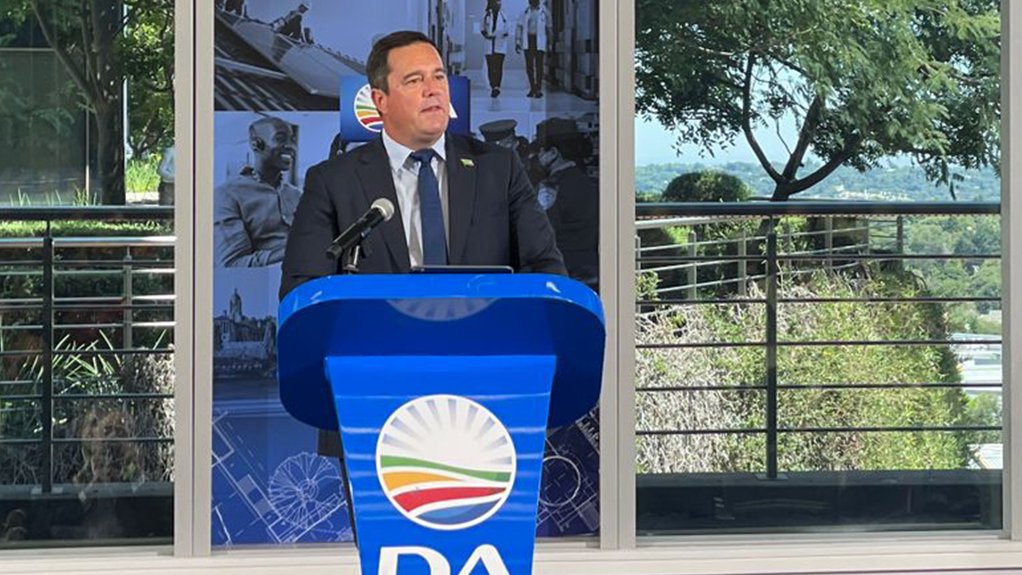The Democratic Alliance (DA) has promised that it will fix Parliament and turn it into the engine room of reform, once the party is voted into government.
The DA announced its “Blueprint to Rescue SA” on Tuesday, which it said would amount to the “most comprehensive legislative reform agenda since 1994”.
Party leader John Steenhuisen said once the DA was in government its first Budget would contain no tax increases, no bracket creep, and it would start to reduce the unaffordable wage and debt bills that “suffocate the economy”.
Within the first 100 days in office, Steenhuisen announced that the DA would introduce legislation aimed at rescuing the country from five key sources of State collapse.
He stated that out of all the political parties in South Africa, the DA was probably the one with the greatest appreciation for the true role of Parliament.
He highlighted that in addition to prioritising the physical reconstruction of Parliament, the DA published a comprehensive plan, last year, in which it laid out how it would make Parliament work again for the people.
“We will do this by creating a committee to oversee the Presidency, increasing the frequency of presidential questions, and introducing penalties when members of the executive fail to answer questions,” he said.
Steenhuisen highlighted that based on the model used in the Western Cape legislature, the DA would also reintroduce interpellations, which are snap debates that force Ministers to account.
He added that the DA would empower opposition MPs to serve as committee chairs, to show the party’s seriousness on oversight and accountability.
Steenhuisen promised that the party would also end loadshedding by embracing privatisation, and abolish cadre deployment in favour of merit-based appointments.
Steenhuisen highlighted that within the first 100 days in power, the DA would table legislation to rapidly increase private electricity generation and transmission.
He said the DA would reintroduce its Bill to create an Independent Transmission System and Market Operator, saying this entity would be mandated to urgently establish a fully private market for the trading and distribution of electricity.
Steenhuisen noted that South Africa’s next government would either be “a coalition of corruption” with the ANC and EFF at its heart, which he added will “seal this country’s fate”.
Or, he said, the country would see a Multi-Party Charter government with the DA at its heart, which he said would implement the most comprehensive legislative reform agenda seen in more than a generation.
Steenhuisen stressed that the DA was committed to serving as the anchor of a new multi-party government, and said it would carry its Blueprint into coalition negotiations.
He revealed that in the first budget tabled by a new multi-party government, the DA would push for the introduction of an expanded R75 000 tax rebate to further encourage private households to install solar energy.
The DA’s Blueprint will push to abolish cadre deployment by introducing legislation that outlaws it.
“By expanding on our End Cadre Deployment Bill, we will make it a criminal offence for any politician to interfere in appointment processes, and remove powers of appointment, promotion and dismissal from politicians,” he said.
Instead, the DA wants to fundamentally reform the Public Service Commission to become an independent custodian of the public sector, with a mandate to ensure that all appointments are based strictly on merit and skill.
Steenhuisen noted that his party was looking forward to the outcome of its court challenges to expose the ANC’s complete cadre deployment records and to declare “this evil practice” unconstitutional.
“Success in these court cases will pave the way for us to wipe cadre deployment corruption from the face of South Africa,” he noted.
He said the party will also prioritise crime fighting, with the introduction of the Scorpions 2.0 through a constitutional amendment. This will create an independent anti-crime and anti-corruption institution.
The DA will introduce a Devolution Bill to devolve policing powers to competent provincial and local governments, which Steenhuisen explained will not only bring policing closer to the people but will also reduce violent crime by empowering well-run local governments to hire skilled, competent, and properly trained and equipped officers.
EMAIL THIS ARTICLE SAVE THIS ARTICLE ARTICLE ENQUIRY
To subscribe email subscriptions@creamermedia.co.za or click here
To advertise email advertising@creamermedia.co.za or click here











